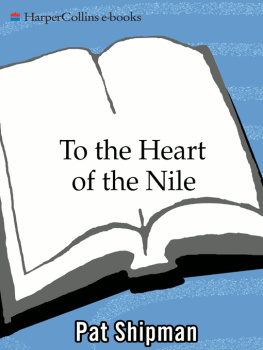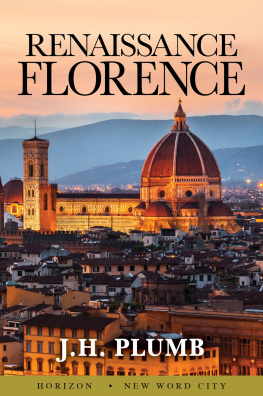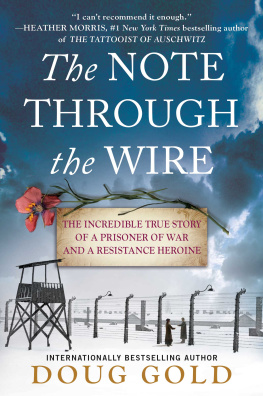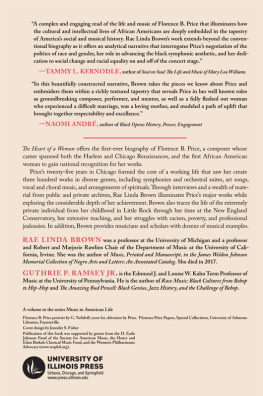To the Heart of the Nile
Lady Florence Baker
and the Exploration of
Central Africa
Pat Shipman

For the Baker family, past and present,
who have inspired me with their indomitable courage
and open-hearted generosity
CONTENTS
This book would not have been possible without the generosity and cooperation of the Baker family, to whom I express my deep gratitude, although I know they may not always agree with my interpretations.
Of many willing and helpful archivists I contacted, Sarah Strong of the Royal Geographical Society and Jane Hogan of the Sudan Collection at Durham University stood out for going above and beyond the call of duty. So did Eric Novotny and the indefatigable interlibrary-loan staff of Penn State University. Johanna and Joszef Geml read and translated much information from Hungarian for me; Alex Miron and Andreea Trasca translated from the Romanian, rewrote a letter into Romanian, and placed a phone call to the Colegium Bethlen Gbor for me, which resulted in a very useful response from Gyorgy Dionisie, the librarian, pertaining to the Szsz family. Donna Chen of the Family History Center in State College, Pennsylvania, assisted me in obtaining additional information about the Szsz family. Zsuzsa Berend, of UCLA, and Cornell Fleishman, of the University of Chicago, patiently answered questions about Hungary and the Ottoman Empire in my quest to understand Florences past. My niece, Karen Walker, offered temporary housing and lasting advice at a few critical moments, as did my brother-in-law Gerald Walker and his wife, Ida Int Veldt. Anjali Singh and Ian Maxted offered small but crucial bits of information. Janet Padiak at University College, London, went on an unfortunately fruitless search for a record of Florences first passport for me at the Public Record Office. Ayhan Irfanoglu kindly obtained for me a usable scan of the image that appears on page 6 in this book. My friends Barbara Kennedy and Cheryl Glenn offered moral support and editorial advice. I thank my editors, Jennifer Brehl of HarperCollins and Sally Gaminara of Transworld, for gentle, helpful editing.
Last but never least, I wish to thank my husband, Alan Walker, with whom I spent years of my life (albeit a few months at a time) in Africa and with whom I learned to love Africa and Africans. Together we discovered the joys of Sam and Florence Baker, many years ago. He has never doubted I could write Florences story and I am grateful for that and so much more.
F LORENCES EARLY LIFE IS SCANTILY DOCUMENTED; SHE HAS ALWAYS BEEN A LADY OF MYSTERY . A LTHOUGH I HAVE HAD SOME SUCCESS IN TRACING RECORDS OF HER NATAL FAMILY , I HAVE DERIVED MANY OF THE DETAILS ABOUT HER EARLY LIFE FROM B AKER FAM ILY LEGENDS OR I HAVE DEDUCED THEM FROM EXTENSIVE RESEARCH INTO THE H UNGARIAN R EVOLUTION AND THE O TTOMAN SLAVE TRADE . R ATHER THAN USING CUMBERSOME CONSTRUCTIONS SUCH AS SHE MIGHT HAVE SAID OR HE MUST HAVE WONDERED , I HAVE ATTRIBUTED THOUGHTS AND WORDS TO F LORENCE AND THE PEOPLE IN HER LIFE THAT ARE IN KEEPING WITH THEIR CHARACTERS AND RECORDED WORDS . A NY QUERIES OR CONCERNS ABOUT THE SOURCE OF QUOTATIONS, FACTS, OPINIONS, AND SPECULATIONS CAN BE RESOLVED BY CONSULTING THE ENDNOTES .
For those who believe the best biographies contain nothing but documented facts, I beg to disagree. All biography is ultimately fiction, as Bernard Malamud has said. As Florences biographer, I consider it my job to portray the deeper truth of her character and a more insightful perspective on her significance than can possibly be conveyed by mere facts. Filling in the gapswhat I prefer to think of as putting forward informed hypothesesis both necessary and appropriate.
I have followed nineteenth-century usage of terms such as black, white, Negro, and native and have quoted some remarks and opinions that may strike the reader as blatantly racist. This is not an expression of my personal views after many years of working in Africa; it is an attempt to portray accurately the attitudes of the imperial, Victorian age.
In direct quotations, I have tried to make the spelling of African names consistent, although the original documents are inconsistent. Because some of the place names cannot be identified with extant places, I have generally followed nineteenth-century spellings such as Florence used. I have occasionally altered punctuation for clarity. In the endnotes I have given modern equivalents, in pounds sterling and U.S. dollars, of all sums mentioned in the text. As some of these are quite impressive, I urge readers to consult the endnotes regularly.
1845 | Barbara Maria Szsz (the future Florence Barbara Maria Szsz Baker) is born in Transylvania. |
1848 | Uprisings all over Europe protest the old monarchies and autocratic empires. |
MARCHMAY 1848 | Hungary unites with Transylvania to declare its independence from Austria. |
JANUARY 8, 1849 | Nagy-Enyed is burned and destroyed by Vlach soldiers; Barbara and her nursemaid flee to join her father Mathias Szsz, who is in the rebel Transylvanian army. |
AUGUST 1222, 1849 | The Hungarian Revolution fails; Louis Kossuth abdicates; General Grgei surrenders to the Russians; thousands of Hungarian refugees flee to Viddin in the Ottoman Empire. |
SEPTEMBER 11, 1849 | Mathias Szsz and nine other officers in the refugee camp draft a letter vowing their allegiance to Kossuth and the revolution and refusing Austrian amnesty. |
SEPTEMBER | About 500 of the refugees convert to Islam |
OCTOBER 1849 | and join the Ottoman army; Mathias Szsz was probably among them. |
C. NOVEMBER 1849 | Barbara is taken for training in the harem; she is renamed Florenz. |
DECEMBER 29, 1855 | Henrietta Baker, first wife of Sam Baker, dies of typhus. |
1856 | Richard Burton and John Speke set out to discover the source of the Nile. |
LATE JANUARY 1859 | Florenz is sold at an elite white slave auction in Viddin; the pasha of Viddin is the high bidder, but she leaves with Sam Baker and becomes Florence. |
FEBRUARY 1859 | Florence and Sam in central Europe. |
JUNE 1860 |
MAY 9, 1859 | Speke returns to England announcing the discovery of the source of the Nile, a lake he named the Victoria Nyanza. |
MAY 2123, 1859 | Burton returns to England, disputes Spekes claims, and receives the Victoria medal from the Royal Geographical Society. |
APRIL 27, 1860 | Speke and James Grant leave for Africa to confirm Spekes claim. |
MARCH 1861 | Florence and Sam arrive in Cairo to begin exploring the Nile tributaries of Abyssinia. |
JUNE 11, 1862 | Florence and Sam reach Khartoum. |
DECEMBER 2, 1862 | Sam writes his will, leaving considerable money to Florence. |
DECEMBER 18, 1862 | Florence, Sam, and their men leave Khartoum by boat. |
FEBRUARY 2, 1863 | Florence and Sam reach Gondokoro, a slavers station and the rendezvous point for Speke and Grant. |
FEBRUARY 15, 1863 |










